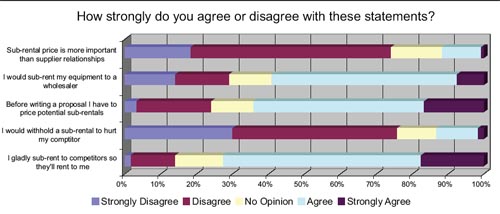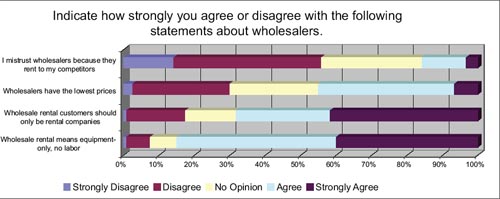Amateur Hour

- How much AV rental gear do you have to own before you can call yourself an AV Rental company? How much does it take to be a stager? When staging colleagues get together, we often talk about the influence of wholesale rental suppliers on the events industry as a whole. While we have all enjoyed the generally low prices and increased accessibility to technology, these same attributes have spawned unforeseen competitors to established stagers. Of course I am talking about the independent stager who doesn't own any (or much) equipment. They sell the show and rent everything from a full-service stager or piece it together from wholesalers or multiple rental or staging companies. Stagers tend to look upon these wannabe stagers as unfair competitors. They have little or no overhead and can easily undercut the pricing of the established stager that has employees, a balance sheet, and fixed overhead costs.
- Do these no-overhead stagers design shows, manage projects, and get held to the same standards as "real" stagers? Or are they perhaps misleading their customers into thinking that their resources are on par with a full service staging company? I think most R&S managers can recall multiple stories where one of these wannabe stagers called in the middle of the night to get bailed out of a botched job, equipment snafu, or technical challenge of some sort. In my career as a stager, I never minded helping out a competitor in that situation, but I know I resented being asked to help someone who shopped all over town for parts and pieces and then expected me to make it all work. You can certainly envy their financial advantage, but would you want to do business the way they have to?
- Independent stagers just might not realize how they are perceived or why their form of business is looked down upon. After all, many of them have not run a vested business or taken the risks that made your company a success. But that doesn't take the edge off the fact that they have an unfair advantage over an unsuspecting customer. The question you need to be asking as a fully vested stager is why are they winning this business in the first place? Is it lower prices? Let's hope not.
- What is the value proposition that convinces your longtime staging customer to switch over to a person with no overhead, no employees, and no inventory? If your answer is price and price alone, then YOU are the reason the customer switched. Customers -- including you -- rarely change based solely on price. It may look that way, but generally it's "all things being equal" take the lower price. Why did that customer look at you and their non-stager option as equals? After all, you have after-hours support, a trained staff, and a long success record. Could it be that the customer didn't see the value in those resources?
- This is just another example of how technology trends are eroding your value proposition. Traditionally, as stagers we have sold expertise and engineering because: what we do is magic to the customer. What the wannabe stager sells is the fact that what we do is not rocket science. They won't win every customer, just the ones that respond to their message. The fact of the matter is that these individuals (indeed, some are actual companies) are real competition. Do you know which of your customers are potential defectors? If so, then the problem is half-solved. You just identified those customers that buy differently from the way you sell. The most common difference between the non-stager and the typical R&S sales person is that the non-stager is part of the value proposition in the transaction. In effect they are often the technical director and project manager. The customer gets to deal directly with the person who will make things happen, which is generally NOT how sales people are perceived. For that customer, the sales person is overhead they shouldn't have to pay for. The price is not something to be negotiated, it is something that gets designed as the independent stager (or your project manager) links decisions to costs in practical terms.
- What's this all mean? The short answer is that you need to start connecting your customers with the right contact in your company. Don't use a sales person where they aren't needed and recognize how important Project Managers are to the customer relationship. Before all the PM's reading this rush in to negotiate a pay raise, consider the skills that make some of the independent stagers successful: broad event experience, CAD skills, creative design, access to a wide range of knowledge resources, and detailed scheduling and project management, and excellent customer management skills. Being called a Project Manager doesn't necessarily make you one. When your Project Managers are as good as the independents, then the only real competitive advantage of the wannabe stagers will be their independence.
Sub-rentals, Suppliers, and Wholesalers
By Tom Stimson, CTS
This months survey asked about your relationships with suppliers, competitors, and wholesalers and apparently touched a few nerves. The good news is that friendly competition is alive and well. Over 70 percent of the respondents feel that relationships are more important than price when it comes to sub-rentals. And over 60 percent would rent to a wholesaler suggesting that these suppliers are in many ways peers. Only a small percentage (15 percent) said they would withhold a sub-rental to hurt a competitor. And 75 percent said they strive to have mutually beneficial sub-rental relationships.
When it comes to wholesalers, the discussion becomes a little more opinionated. More than half of the respondents say they do not mistrust wholesalers and a slim majority believe they have the lowest prices. Over 40 percent strongly agree that wholesale customers should be rental companies and roughly the same number feel that wholesale rental means equipment only and no labor.
The survey essay question yielded a huge number of rather diverse responses. We asked:
In general, how have your views about wholesale AV rental suppliers changed in the past two years? Why?
Some answers were thoughtful and constructive:
A daily selection of the top stories for AV integrators, resellers and consultants. Sign up below.
We are very encouraged about how the wholesale rental companies are adapting to our industry. AV rental houses that are sensitive to our schedules, have the gear we need, and will work with us on special circumstance events will continue to get more business from us in the future.
-Rusty Ranne.y Live Technologies, Inc.
It obviously has increased pressure on the pricepoint of shows simply due to the large availability of gear. Gone are the days of "you have the boxes, so you get the show". But it still comes down to simply having the best service for that client and, preferably, showing with your 95 percent of your own gear. No one owns everything. -Francis Collette, Multimedia Presentation Group
The national rental houses have changed the business forever and have limited the number of times where I have to make a speculative investment in technology to secure a piece of business. We see them as an asset and work with several to ensure that our clients get the best solutions without having to tie up capital for short term projects. -Anonymous
Others latched onto the independent stager theme:
Smaller companies that do not stock equipment of their own are hurting the market by undercutting prices and not being experts with the equipment they use/provide. -Anonymous
Wholesalers lower the bar for entry for show providers, but may also prevent techs from getting up to speed on new, complicated equipment. Also, many long term relationships between dealers have largely disappeared, for better or worse. -Collin Loewen, Data Display
Then there were several very critical comments that mirrored this response (one of the few printable negatives):
We've found the wholesalers to be a very convenient and effective tool for several years now, but as these companies grow in size, we have seen a lot less consistency with quality control. More DOA equipment, screens with stains or damage, missing parts, etc. -Anonymous
Clearly this is an emotional topic, but one that affects almost every aspect of our industry.
Download the complete January 08 Survey including dozens more illuminating comments from respondents at: www.trstimson.com/surveys.
Each month The Stimson Group conducts a short survey of AV industry professionals about a variety of topics. To participate in or comment on those surveys, email: surveys@trstimson.com.

